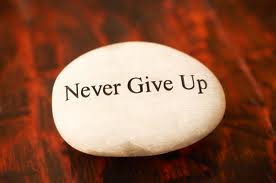I’ve listened to many keynote speakers, presenters and panelists talk about the importance of resiliency over the years for Blacks, other people of color, poor people and women. What I’ve yet to hear is a speaker getting real about resilience: the tools they used, the situations they faced and who/what helped them along the way. Hearing a soundbite or resume recant isn’t enough for me.
What do I mean? I want these people who embody resilience to share:
- What they did to survive the trials and tribulations they went through
- The roadblocks they encountered and how they got pass them
- Specific examples of when they stumbled, fell or failed and got back up
- Who helped them
- Who didn’t help them.
- What they did when people and organizations didn’t help them or tried to block them.
Instead, the speakers I have heard stay strictly rah-rah (motivational) . They share but do not show.
“It’s got to be real” to quote singer Cheryl Lynn of the song by the same name.
Being real:
- How did you handle the taunts and teasing when you wore hand-me-down clothes clearly too big or too small from you?
- How did you pay for your college texts when you found out your scholarship didn’t cover books (and your family had no money to help you)?
- How did you raise 5 children (2 girls, 3 boys) in the middle of the a violent neighborhood who all graduated from college?

- How did you keep walking to and from the bus stop after those kids jacked you up?
- How did you juggle working two jobs while going to school full-time?
- What did you do when you felt you were over your head in class or in a job?
- How did you handle being the oldest of 3, 5, or 13?
- How did you work through fear of the unknown?
- How did you handle being the only or one of a very few Black students, team members, employees, or board members?
- When have you spoken out?
- When have you stayed silent?
- Do you have criteria for when you do which of these things?
- Have you hand mentors?
- Did they actively mentor you or did you check them out on the QT and follow them?
Please give specifics. It’s got to be real.
- Do you think the challenges that you faced strengthened you? Have you ever felt deflated by having to be resilient?
- Did everyone who started with you on your journey (siblings,friends, family, and neighbors) make it as well?
- Did luck or serendipity have a hand in your resiliency?
- How have you stayed the course?
- What didn’t you get despite your best efforts?
- How did you move on from this disappointment/ failure?
but please, break it down so someone else can learn.


I’ve been fortunate to have had 2 mentors…both were older, more experienced, and had experiences that made huge differences in their professions. One was a white, older woman and the other a very successful black artist. The white woman was Irish and considered an “outsider” in the area we worked. I was the only black. She shared much with this “only black” staff member for many reasons, but I’d like to think she wanted me to succeed if for no other reason than to have a longterm ally. She tutored me on many office/business nuance, which coming from a poor, working class non-college or business family–was huge! The other, a famous black artist was very careful on instruction/suggestions and oftentimes I wasn’t sure whether he the information he imparted was important or not. I always had to review the information–after the fact. It was as if he were giving away state secrets and really did not want me to share the information. Why are we more skeptical with among our own? In my professional life, rarely have I seen or heard of blacks mentor each other. Now that the tables are turned (I’m older and have experienced much…) I make a point in offering mentorship whenever possible, to try in some small way–to change the continuum of “not sharing.”
Thank you so much for sharing the two mentors you had in your life – one from your ethnic culture and one not; one from your gender and one night. We need caring and principled people all along the way to help us live and grow. I, too, have noticed that some of “my peeps” share very sparingly and reluctantly if at all. Perhaps we have such low expectations of each other. Perhaps we have shared with someone who misused or abused the information and so we therefore cut off anyone who looks like them. I believe that there is enough out there for everyone to get plenty of goodies on this journey called life. Like you, I mentor and share opportunities, information and – when appropriate – feedback to younger people (and to my age-peers who keep doing the same thing and expecting a different result).
Thank you for this topic on resilience. I know I’m very resilient (let me count the ways!). Resilience has been a theme throughout my life, even when I didn’t know that that was what I was experiencing. I spent the first 10 years of my life in segregated VA and as a young child I couldn’t understand why white people hated me just because I was black. I was resilient because my parents, especially my Boston-born mother, and my Village of black role models, made me know my life does matter. While it took many years for me to process and recover from sexual abuse at age 8, it was through telling – though not until we had left VA and moved to Boston & I felt safe – my parents, who believed me and years of counseling. And it was choosing to write my dissertation on the Resilience of African American, Ways of Coping & Healing women who experienced childhood sexual abuse, did I fully recover. I will be forever grateful to the cohort of black women I interviewed for my dissertation because we gave truth and testimony to an experience that many black women (and boys) have had. We shared that we recovered through many ways of coping: therapeutic healing – talk therapy, massage, religion, etc., and artistic expression – journaling, photography, written & spoken word, music, counseling and support groups.
Throughout my adult life I’ve experienced love, marriage, divorce and again love and marriage, job opportunities and job setbacks and all the attendant ups and downs of those various life cycles. I’ve experienced the loss of my parents and two bouts of cancer in the last seven years. An older man from my church who also had cancer told me, people don’t die of cancer, they live with it. That has stayed with me and I think without realizing it, throughout whatever trials I’ve had, resilience requires that I find ways to live, cope and heal in spite of life’s challenges.
Wow. Thanks for sharing abundant evidence of your resilience. You’ve been given a lot to bear. I heard somewhere that if you can name it, you can heal it and I’ve found that to be true. Reading these comments will be instructive to everyone, including sharing your experiences, being believed, learning that you’re not alone and that we live with cancer and other challenges and, if we are blessed, can rise through them. Thanks for sharing such personal and inspiring testimony. That dissertations should be published. I know it would help a whole bunch of people. BTW, I’m a survivor of sexual abuse as well.
BINGO! That is exactly the kind of information that is generally missing because that is the information that comes with a price tag. Your questions are so on point. i’m feeling like it’s your workshop or retreat waiting to be born…just sayin’.
Thanks for sharing!
Thanks for your comments. Not sure I want to do a workshop although I could. I enjoy facilitating conversations so that the nitty-gritty gets addressed. I believe in sharing information and sharing specifics. Lord knows I would have achieved more in terms of materials things and satisfaction if some folks had shared more along the way.
Great post, Candelaria. Your posts always land in my “oh, that’s right, I’m not alone!” sphere. And thanks to the responders as well. Keep sharing the “tools” in your individual toolboxes. Thanks,
Donna
I’ve thought about this post a lot over the past week. Of course I want to say that I did it all “right” – I ate properly; spent time on prayer and money I didn’t really have on massages that help dissolve the tension; exercised; journaled and laughed with friends. But the truth is these were the things I tried (and they did really help once I got to them) when I’d realized I had nothing to rely on and nowhere to go but up, so to speak. Over the years what someone else might call “resilience” is what I’d call just being “used to it”. I can measure stressful times in my life against whether or not they are as stressful as some of the others and simply survive that way, just as I always have. You press forward not thinking too much about the details – it is what it is – and until you get past a certain time or place or emotional moment, there’s little else you can do about it besides just put one foot in front of the other. There were broken moments at every crossroads in the journey, that is for sure. But what else could I do but keep going?
Your comments are very thought-provoking. I think that even when we are “just being used to it” that is a form of resilience. Some people do not keep putting one foot in front of the other. Perhaps, we each have to have an eternal motivation to keep going on or make a way out of no way. For some people it is faith. For others it is a sense of fierce independence. For some, feeling there is no shoulder to lean on. For still others, having children or family members who depend on us. Whatever it is, millions have resilience but there are others who are fragile and don’t. Thanks for taking the time to leave a comment.